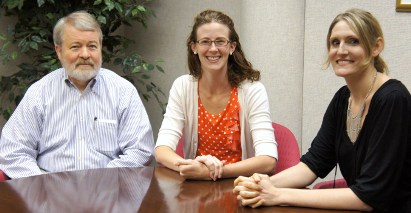Center for Law, Health & Society | News and Events | Center News | 2012 Archive | Law Students Shadow Grady Health System Medical Ethicist Law Students Shadow Grady Health System Medical Ethicist
July 12, 2012
ATLANTA – Health law students at Georgia State University College of Law clamor to enroll in Professor Paul Lombardo's courses on bioethics, genetics, and mental health. While all his courses elicit active discussion and engagement with cutting-edge topics, Lombardo felt there was still a need for students to experience how critical decisions about ethical dilemmas are actually made in the field.
 "Paul offered the perfect opportunity for interdisciplinary collaboration with Grady Health System's medical ethicist," said Charity Scott, Director of the Center for Law, Health & Society. From her work with Emory University's Center for Ethics, Scott knew Jason Lesandrini, Grady Health System's medical ethicist and adjunct faculty for Mercer University, who had expressed an interest in working with law students in a practicum setting.
"Paul offered the perfect opportunity for interdisciplinary collaboration with Grady Health System's medical ethicist," said Charity Scott, Director of the Center for Law, Health & Society. From her work with Emory University's Center for Ethics, Scott knew Jason Lesandrini, Grady Health System's medical ethicist and adjunct faculty for Mercer University, who had expressed an interest in working with law students in a practicum setting.
Lombardo agreed to pilot a project on-site at Grady, creating an opportunity for students to shadow the ethicist as part of an independent study during spring semester. "I had supervised this kind of experience at the University of Virginia hospital for many years, so I knew it would be valuable for the students," said Lombardo.
Jane "Danny" Vincent, 3L, who was enrolled in Lombardo's Genetics & the Law course, and Jena Jolissaint, 3L, who had taken Lombardo's Bioethics course in the fall, jumped at the chance to participate in this experimental project.
"In class, whether we were discussing beginning-of-life issues, end-of-life issues, and all of the issues in between, the overarching issue was always who should decide. For example, what if a patient is unable to provide informed consent due to lack of capacity and the family disagrees with the medical team, or with each other?" said Jolissaint. "This independent study provided the opportunity to see how decisions are made by a hospital ethics committee when there is a gray area in the black-letter law."
As part of the independent study, the students attended rounds with Lesandrini, participated in consultations, and observed meetings of the medial ethics committee. One consult involved a terminally-ill patient without a designated decision maker. "The legal options were discussed, but it was soon clear that either decision the medical team could make would be well within the medical standard-of-care," stated Jolissaint. "The ethics consult began when the need for legal expertise ended."
"All of the issues we observed have legal frameworks that set the outer boundaries of medical decisions, but they also all have questions that are unanswered by the law," agreed Vincent. "I am fascinated by the relationship between law and ethics. As medical science advances, ethics informs and shapes the law. The law still leaves unsettled areas to be informed by ethics, and so the evolution continues."
The students also entered data from past patient cases that had involved an ethics consultation with members of the Grady's ethics committee. "Of the many cases I entered into the database, only a handful had an actual ethical problem, rather than one better suited to resolution by the social worker, legal counsel, or the medical team," observed Jolissaint. "Since the ethicist is involved in so many aspects of the hospital and interacts with both staff and patients, he is often a hub for patient care issues that fall within the descriptions of other staff positions, not unlike attorneys who find themselves connecting clients to community resources and exploring non-legal alternatives to best meet their clients' needs."
The semester was an informative introduction to applied ethics in a hospital setting. "The students' experience was everything we expected," reflected Lombardo. "There is no better place to see ideas about bioethics play out in real time than in a busy general hospital like Grady."
"The students brought a unique perspective to the ethics program at Grady Health System and we all enjoyed their input," commented Lesandrini. "I am glad we were able to provide them with some real-world experience. As each of us who practices clinical ethics quickly learns, what's provided in bioethics textbooks is often quite distinct from what takes place on the hospital floor."
"Shadowing the medical ethicist allowed our students to experience hospital decision-making first hand," said Scott. "We hope to be able to give more students a chance to observe the Grady ethics service in the coming year," Lombardo agreed. "Our plan is to continue the pilot program next spring."
To read Jena Jolissaint's reflection, click here.
To read Jane "Danny" Vincent's reflection, click here.
Contact:
Stacie P. Kershner, JD
Associate Director, Center for Law, Health & Society